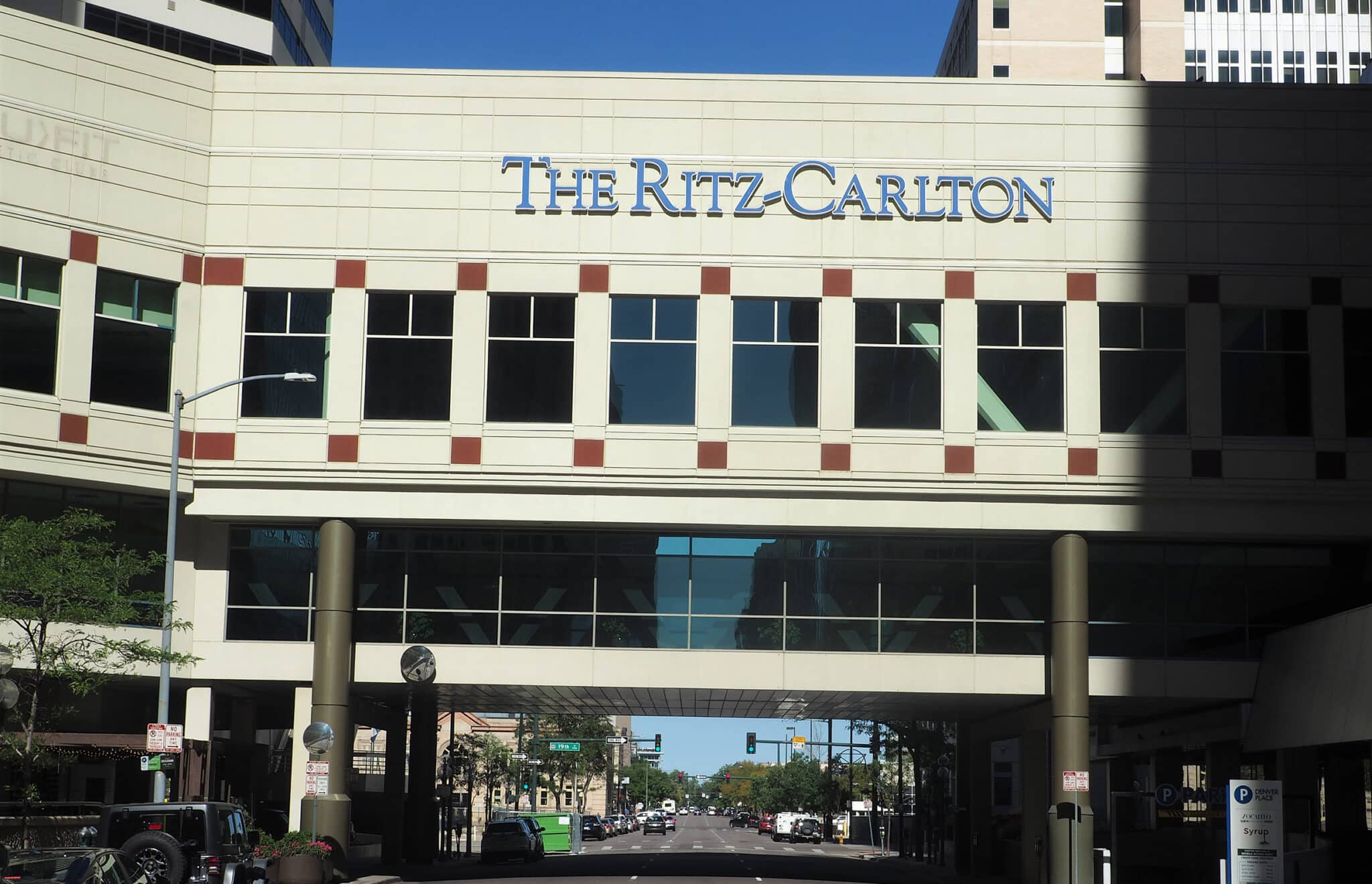
The Bridge at 1849 Curtis St. Unit 4A connects Denver Place to the Ritz-Carlton in the Central Business District. (Justin Wingerter photo)
The Ritz-Carlton hotel in downtown Denver has been accused by a neighbor of running a $3.2 million fraud and extortion scheme.
The dispute involves an unusual building, sometimes called The Bridge, that stretches over Curtis Street in the Central Business District.
The vacant three-story, 31,000-square-foot structure connects Denver Place with the Ritz-Carlton. It has steam rooms, showers and saunas, an indoor pool and hot tub, a gym and other fitness center staples. The space was most recently occupied by TruFit Athletic Clubs.
Thirteen months ago, Store Capital, the Arizona company that owns The Bridge, agreed to sell it to a Florida company for $3.2 million, according to Store. But just before the closing date, the buyer received a letter from Xenia Hotels, which owns the Ritz-Carlton.
The letter claimed the Ritz’s previous owner and The Bridge’s previous owner signed an agreement in 2008 that allows guests at the hotel to use what was then the Denver Place Athletic Club. It argued that agreement is still binding, even though the club is long gone.
The Bridge’s buyer was scared off by the letter and backed out, Store claims, and that same letter has kept other prospective buyers away, according to a lawsuit filed Sept. 21 in Denver District Court. Store is suing Xenia Hotels and its president, Barry Bloom.
The lawsuit alleges Xenia and Bloom know the 2008 agreement has long been void, so the letter they send to prospective buyers is “a transparent and deliberate attempt to extort from Store either use rights or a payoff” as part of a “fraudulent” scheme.
Florida-based Xenia Hotels did not respond to requests for comment about the lawsuit.
Store is asking Judge Stephanie Scoville to issue a declaration making clear the Ritz-Carlton has no claim to The Bridge. Store also believes Xenia should pay it $3.2 million, plus interest, attorney fees and an undetermined amount of punitive damages.
Store is represented by attorneys Patrick Compton, Alexia Chapman and Craig Solomon Ganz from the national law firm Ballard Spahr, which has a Denver office.

The Bridge at 1849 Curtis St. Unit 4A connects Denver Place to the Ritz-Carlton in the Central Business District. (Justin Wingerter photo)
The Ritz-Carlton hotel in downtown Denver has been accused by a neighbor of running a $3.2 million fraud and extortion scheme.
The dispute involves an unusual building, sometimes called The Bridge, that stretches over Curtis Street in the Central Business District.
The vacant three-story, 31,000-square-foot structure connects Denver Place with the Ritz-Carlton. It has steam rooms, showers and saunas, an indoor pool and hot tub, a gym and other fitness center staples. The space was most recently occupied by TruFit Athletic Clubs.
Thirteen months ago, Store Capital, the Arizona company that owns The Bridge, agreed to sell it to a Florida company for $3.2 million, according to Store. But just before the closing date, the buyer received a letter from Xenia Hotels, which owns the Ritz-Carlton.
The letter claimed the Ritz’s previous owner and The Bridge’s previous owner signed an agreement in 2008 that allows guests at the hotel to use what was then the Denver Place Athletic Club. It argued that agreement is still binding, even though the club is long gone.
The Bridge’s buyer was scared off by the letter and backed out, Store claims, and that same letter has kept other prospective buyers away, according to a lawsuit filed Sept. 21 in Denver District Court. Store is suing Xenia Hotels and its president, Barry Bloom.
The lawsuit alleges Xenia and Bloom know the 2008 agreement has long been void, so the letter they send to prospective buyers is “a transparent and deliberate attempt to extort from Store either use rights or a payoff” as part of a “fraudulent” scheme.
Florida-based Xenia Hotels did not respond to requests for comment about the lawsuit.
Store is asking Judge Stephanie Scoville to issue a declaration making clear the Ritz-Carlton has no claim to The Bridge. Store also believes Xenia should pay it $3.2 million, plus interest, attorney fees and an undetermined amount of punitive damages.
Store is represented by attorneys Patrick Compton, Alexia Chapman and Craig Solomon Ganz from the national law firm Ballard Spahr, which has a Denver office.
